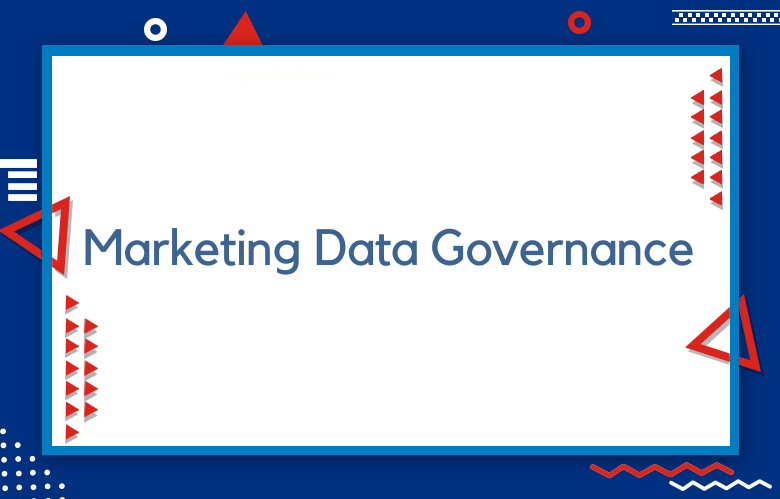Marketing Data Governance for Marketing Leaders

In today’s data-driven digital marketing landscape, marketers must make informed decisions based on accurate data to stay competitive. However, the sheer volume and variety of data can be overwhelming, making data management and analysis challenging.
This is where marketing data governance comes in. In this blog post, we will explore marketing data governance, why it is essential, and how it can help marketing leaders make the right decisions for their organizations.
How can Marketing Data Governance Help Marketing Leaders?
Marketing leaders are responsible for driving the business by making data-driven decisions, developing marketing strategies, and measuring the effectiveness of campaigns.
Marketing data governance provides the necessary infrastructure to help them leverage data effectively. By gaining access to accurate, relevant, and timely data, marketing leaders can:
Make Informed Decisions
With accurate data, marketing leaders can decide which markets to target, which campaigns to run, and which channels to use. This can result in better ROI and increased revenue.
Improve Customer Experience
Proper data governance can help marketers understand customer behavior, preferences, and needs, allowing them to create highly personalized and relevant experiences.
Ensure Regulatory Compliance
With regulations like GDPR and CCPA, marketing leaders must ensure that their data complies with regulations. Marketing data governance helps businesses meet these requirements.
Mastering Marketing Data Governance: A Guide for Marketing Leaders
In today’s digital world, data has become an indispensable asset for organizations, especially for marketing teams who rely on data for decision-making, customer targeting, and overall marketing strategy.
However, the sheer volume of data available can be overwhelming, and without proper governance, it can result in costly mistakes, regulatory risks, and reputational damage.
Mastering marketing data governance is a crucial skill for marketing leaders. It involves establishing policies, processes, and controls to ensure the organization’s data is accurate, consistent, secure, and compliant with regulations.
To achieve this, marketing leaders must understand the importance of data governance, the critical elements of a framework, and techniques to implement effective data governance practices.
Unlocking the Power of Data Governance in Marketing
Data governance has become an essential component of modern marketing strategies. Marketers must collect and analyze vast amounts of data to gain insights into their target audience and devise effective campaigns.
However, with the explosion of data, managing it has become increasingly complex, and the quality and accuracy of data have become significant concerns for companies.
Data governance refers to the framework, policies, and procedures ensuring data is managed, stored, and shared appropriately.
It provides guidelines on data quality, privacy compliance, and security measures to mitigate the risks associated with data management.
By implementing data governance practices, businesses can ensure that their data is accurate, complete, and up-to-date and only accessible and used by authorized personnel.
The Art of Data Governance for Marketing Leaders
Data governance has become increasingly important for marketing leaders in today’s age of advanced technology and data-driven marketing strategies.
The art of data governance refers to the systematized management of organizational data to ensure its accuracy, reliability, confidentiality, and accessibility. Effective data governance is critical for optimizing marketing campaigns, enhancing customer experiences, and achieving business goals.
Marketing leaders who practice data governance possess the skills and knowledge to manage data effectively and safely, a key responsibility in today’s fast-paced business environment.
Such leaders understand the significance of data quality, privacy, and security and develop policies and procedures to ensure that all data practices comply with legal, ethical, and professional standards.
Data Governance Demystified: Marketing Leaders Edition
Data governance is becoming increasingly crucial for businesses in the modern digital age, particularly for marketing leaders who rely heavily on customer data to drive campaigns and optimize performance.
However, data governance can often seem complex and daunting, leaving many marketing leaders feeling intimidated and unsure of where to begin.
To demystify data governance for marketing leaders, it is essential to understand that, at its core, data governance is simply a set of practices that ensure the proper management, utilization, and protection of data in an organization.
This includes establishing clear policies for data management, defining roles and responsibilities for data stakeholders, and implementing technology solutions that support effective data governance.
Building a Strong Foundation with Marketing Data Governance
In today’s data-driven business landscape, organizations have increasing marketing data at their disposal. This raw data can be valuable in creating insights that drive marketing decisions and improve business performance.
However, before marketing data can be leveraged meaningfully, it is essential to establish a strong foundation for its governance to ensure the data’s quality, accuracy, and security. Consequently, this is where Marketing Data Governance comes in.
Marketing Data Governance is creating, implementing, and managing the policies, standards, and procedures governing an organization’s marketing data.
Its goal is to ensure the data is easily accessible and accurate and meets regulatory requirements. Effective governance requires collaboration between marketing, IT, and other departments.
Maximizing ROI through Effective Marketing Data Governance
Maximizing ROI through Effective Marketing Data Governance is crucial to any successful business. It involves creating a framework for collecting, managing, and analyzing marketing data to derive valuable insights and optimize marketing investment.
With the increasing amount of data available today, effective marketing data governance is more important than ever.
It involves setting clear policies and standards for data collection, storage, and analysis to ensure data accuracy, consistency, and security. This framework helps businesses to make informed decisions based on data-driven insights rather than vague assumptions.
A solid marketing data governance strategy can help businesses maximize their ROI by unlocking insights into customer behavior, preferences, and trends.
Harnessing the Potential of Data: A Marketing Leader’s Guide to Governance
In today’s interconnected world, data has become one of the most valuable assets businesses can leverage to drive growth and retain their competitive edge.
Data-driven marketing has emerged as a critical driver of business success. It enables companies to gain deep insights into consumer preferences and behavior, personalize their messaging, and deliver a more tailored, engaging customer experience.
However, with great power comes great responsibility. Data’s sheer volume and complexity can be overwhelming, and marketers must be aware of the potential risks of mishandling this valuable resource.
Data governance is critical to any effective data-driven marketing strategy, ensuring that data is managed and utilized ethically, responsibly, and compliantly.
Best Practices for Marketing Data Governance
To succeed in marketing data governance, businesses must establish a robust framework and follow best practices. A few best practices include:
Appoint a Data Governance Team
Establish a team responsible for data governance, consisting of data stewards, analysts, and IT professionals.
Define Data Policies and Procedures
Develop clear policies and procedures around data collection, storage, and use, ensure regulatory compliance, and define data ownership.
Conduct Regular Audits and Data Quality Checks
Regularly audit the data, identify inconsistencies, and develop plans to resolve them.
Invest in Technology
Invest in data management technologies like data governance software, master data management, data quality, and metadata management tools.
Conclusion
marketing data governance is crucial for marketing leaders to succeed in today’s data-driven marketing landscape.
It enables businesses to achieve data accuracy, quality, consistency, and security, making informed decisions, providing better customer experiences, and ensuring regulatory compliance.
By following best practices and investing in the right technology, businesses can establish a robust marketing data governance framework and drive their success.
Call: +91 9848321284
Email: [email protected]



